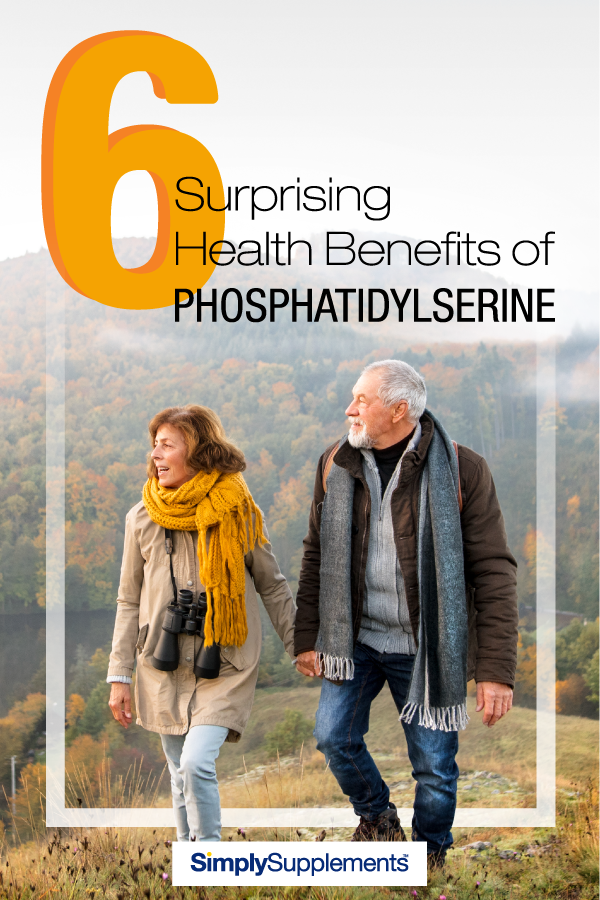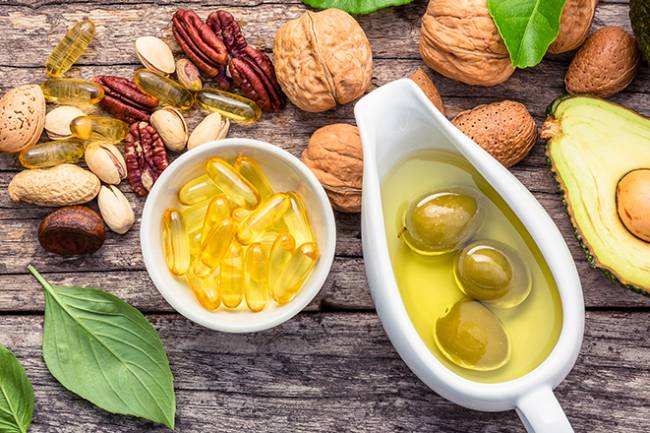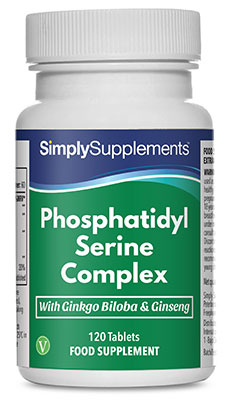The Health Benefits of Phosphatidylserine

Phosphatidylserine is the name given to a type of phospholipid found naturally in the body.
Phosphatidylserine plays a number of roles in the body. Firstly, it forms an important part of cell membranes.
Secondly phosphatidylserine is found in the myelin sheath that encases our nerves and is responsible for the transmission of impulses.
It is also believed to be a cofactor in a range of different enzymes that affect communication within the body.
These factors combined mean that Phosphatidylserine has a very important role to play when it comes to the central nervous system.
Whilst it is a natural substance that can be produced in the body or derived from our diet, with age our levels of Phosphatidylserine can start to fall. When this happens, experts believe that it impacts our nervous system, leading to cognitive decline and reduced reflexes.
Studies on the impacts of boosting Phosphatidylserine levels in the body through supplementation indicate a range of exciting benefits as we will see.
The Benefits of Phosphatidylserine
According to the Alzheimer's Society, one in six people over the age of 80 suffers from dementia. While the likelihood of such a diagnosis does increase with age, it can also affect much younger victims.
As the population ages, so scientists have invested time and money into the study of dementia, and the search for possible treatments. Phosphatidylserine is just such a compound and we therefore know quite a bit about the potential benefits of supplementation. Here are some of the more interesting potential benefits pointed at by recent research...
Improved Cognitive Function
Possibly the most exciting research carried out on Phosphatidylserine, which is also sometimes known as PtdSer or just PS, focuses on the potential benefits for halting or even reversing the symptoms of cognitive decline.
In one study, 131 elderly patients were provided with a supplement containing either Phosphatidylserine and DHA or a placebo. After 15 weeks both groups underwent tests designed to assess their cognitive function. The findings revealed that those taking Phosphatidylserine saw significant improvements in verbal recall and learning. They were also able to copy complex shapes with greater speed. Another similar study using Phosphatidylserine showed a 42% increase in the ability to recall memorised words.
Elsewhere, a group of memory-challenged volunteers aged between 50 and 90 years old were provided with Phosphatidylserine supplementation for a period of 12 weeks. Testing demonstrated improvements in memory recall and mental flexibility. The same study also unexpectedly found that those individuals taking the supplement saw a gentle and healthy decline in their blood pressure.
Lastly, in an extensive study almost 500 patients aged between 65 and 93 were recruited in Italy. Supplementation with Phosphatidylserine was provided for a period of six full months before responses were tested. Statistically significant improvements were seen not just in terms of cognitive parameters, but also behavioural elements too.
So far, the evidence seems to suggest that Phosphatidylserine may have an important role to play in the fight against age-related memory loss and a general decline in mental acuity.
Fights Depression
There are other studies which also support the viewpoint that Phosphatidylserine may help to improve mood and guard against depression.
This time, a group of young adults suffering from stress were provided with either with 300mg of Phosphatidylserine or a placebo each day for a month. The experts reported that those individuals taking the supplement experienced “an improvement in mood”.
Another study of the effects of Phosphatidylserine on mood involved a group of elderly women suffering from depression. The active group were provided with 300mg of Phosphatidylserine per day and routine testing measured the supplements impact on mental health. The participants experienced noticeable improvements in depressive symptoms and general behaviour.
Improved Sports Performance
While Phosphatidylserine has gained most attention for its potential role in mediating the symptoms of senility, other potential benefits have also been found. When healthy sports people receive the supplement it seems that sporting performance may be experienced.
Golfers, for example, have been shown to improve their game after provision of Phosphatidylserine, while other studies have found that individuals consuming Phosphatidylserine perceive far lower levels of fatigue after exercise. Consumption of 750mg per day of Phosphatidylserine has also shown to improve exercise capacity in cyclists.
In one fascinating study, healthy men aged between 18 and 30 were asked to complete mathematical tests both before and after a heavy resistance training program. The experts found that those individuals being supplemented with Phosphatidylserine completed answers almost 20% faster than the control group, and made 33% fewer errors.
It has therefore been suggested that Phosphatidylserine may have a role to play in sharpening reflexes, speeding recovery after intense physical and maintaining mental accuracy under stress. As a result, Phosphatidylserine may have a place in the training of professional athletes.
Physical Stress Reduction
When we exercise, the body releases stress hormones. It is these hormones that can affect inflammation, muscle soreness and other symptoms of overtraining.
In one study healthy male subjects were assigned either 600mg of Phosphatidylserine or a placebo, to be taken every day for 10 days. The participants then underwent intensive cycling sessions while their body's response to the exercise was measured.
It was demonstrated that the Phosphatidylserine group restricted levels of cortisol, the stress hormone, and so recovered faster from exercise. It has therefore been suggested that Phosphatidylserine may help to guard against the risks of overtraining experienced by many professional sportspeople.
Reduces Inflammation
Inflammation is implicated in a range of unpleasant health conditions. It has been shown that the fatty acids in fish oils can help to guard against chronic inflammation, and we know that the DHA in cod liver oil can work synergistically with Phosphatidylserine. It should therefore perhaps not be a surprise that some studies show Phosphatidylserine may actually help to guard against inflammation.
Oxidative Damage
Many experts believe that oxidative damage is a major feature in the onset of dementia. It is also associated with general cell damage and has been implicated in a range of unpleasant health conditions. This is one reason for the increasing interest in antioxidants in recent years, as they have been found to help fight against free radicals that might otherwise cause damage.
Studies have shown that Phosphatidylserine may play a part here too, as evidence of its antioxidant properties has been identified.
Should I Take Phosphatidylserine Supplements?
Some Phosphatidylserine can be gained through eating a healthy and varied diet, but equally, modern eating habits, food production, stress and general aging means that often we are not getting the levels of Phosphatidylserine needed for our brain to function properly.
Modern life can be stressful in terms of work and family life, and increased stress leads to an increase in demand for Phosphatidylserine, meaning that often our stressful lives lead to a depletion of this component.
In addition to this, modern, low fat/low cholesterol diets can lack up to 150mg of Phosphatidylserine needed daily and vegetarian diets can lack up to 250mg. Diets with Omega-3 fatty acid deficiencies can reduce the level of Phosphatidylserine in the brain by 28% therefore affecting cognitive function.
Modern food production can also decrease levels of all the Phospholipids including Phosphatidylserine. Research has shown that the elderly can particularly benefit from increasing their levels of Phosphatidylserine.
Aging increases the brain's needs for the Phosphatidylserine while also creating a metabolic insufficiency. This means that it is very difficult to get enough through diet alone. Research has shown that Phosphatidylserine improves age related memory impairment and prevents decay of brain functions, and so can be a crucial supplement for the older generation.
If you are keen to support mental health with age then Phosphatidylserine might just be one of the most exciting supplements available.
Conclusion
Phosphatidylserine is naturally occurring in the brain but our stressful day to day lives, combined with natural aging can increase our need for it. Phosphatidylserine supplements can benefit the brain in a number of ways and scientific studies have shown its effectiveness in improving memory, concentration and learning, leading to a happier, healthier life and brain.

Sources:
https://jissn.biomedcentral.com/articles/10.1186/1550-2783-4-23
https://www.karger.com/Article/Abstract/310330
https://www.ncbi.nlm.nih.gov/pmc/articles/PMC2981104/
https://link.springer.com/article/10.1007%2FBF00280123?LI=true
https://jissn.biomedcentral.com/articles/10.1186/1550-2783-5-11
http://www.sciencedirect.com/science/article/pii/S0899900714004523
https://link.springer.com/article/10.2165/00007256-200636080-00003
http://www.sciencedirect.com/science/article/pii/S0308814612016561
http://www.tandfonline.com/doi/abs/10.1080/1028415021000033802
https://www.ncbi.nlm.nih.gov/pmc/articles/PMC3665496/
https://www.ncbi.nlm.nih.gov/pubmed/12608694/
https://www.ncbi.nlm.nih.gov/pubmed/2027477/
https://www.jstage.jst.go.jp/article/jcbn/47/3/47_10-62/_article
http://onlinelibrary.wiley.com/doi/10.1111/j.1600-0447.1990.tb06494.x/full
http://www.neurology.org/content/41/5/644.short
https://link.springer.com/article/10.1007/BF03324139
https://link.springer.com/article/10.1186/1550-2783-7-S1-P2
http://www.tandfonline.com/doi/abs/10.1080/1028415X.2001.11747360
http://www.sciencedirect.com/science/article/pii/S027153171300078X

 Nicole
Nicole 

























